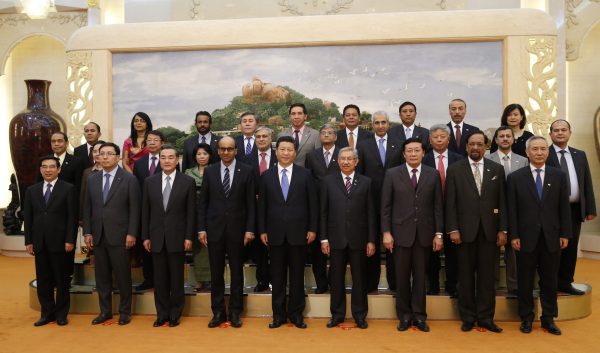In fact, no country has benefitted more from the multilateral development banks (MDBs) in this regard than the United States, the largest shareholder in the World Bank and, with Japan, the largest shareholder of the ADB.
So when China, seemingly overnight, introduces a rival MDB and appears to be making headway in attracting other Asian countries to join, it’s not altogether surprising that the United States would take to the press and through diplomatic channels to try to put the brakes on it. In the name of seeking high standards around issues like environmental and social safeguards, the United States is fundamentally in a scramble to head off a loss of influence in Asia.
But as strategies for maintaining influence go, this is a poor one. At best, it appears feckless, with the United States standing on the sidelines shouting ‘no’. At worst, it risks sending a negative message to the region: not only is the United States unwilling to devote more of its own aid dollars to finance Asian infrastructure, it doesn’t want Asian countries to do so either.
In this way, the US reaction to AIIB marks the latest in a series of missteps that may very well assure a loss of stature in the region. Fortunately, it’s not too late for a course correction.
The United States can start by accepting that key Asian allies are legitimately motivated to join the Chinese in a new MDB. The United States can then look to those allies to work with the Chinese to set appropriate standards for AIIB.
The harder work begins closer to home, and specifically in the ADB, where the United States has direct authority and influence. To the degree the AIIB reflects frustration with the ADB on the part of China and others, in large part that frustration is related to size.
There has been a steady regional drumbeat for more ADB capital in recent years to help meet an estimated US$8 trillion in Asian infrastructure needs. The United States has responded to these calls with a decisive ‘no’. And not just no to more US money in the ADB, but no to more of anybody’s money in the ADB. Sound familiar?
It’s time for the United States to rethink that position. A good first step would be swift approval of the pending financial restructuring at the bank, which would generate significant additional capital for infrastructure investment. Approval of the measure requires the assent of the ADB’s 67 member governments — no easy task. The United States should deploy its considerable diplomatic tools to secure approval for this positive initiative, in contrast to the negative diplomacy that has defined the AIIB response.
Beyond that, the United States should use the opportunity of the ADB restructuring to reconsider the question of additional capital in the years ahead. As a result of the restructuring, the bank will need far less grant support from donors like the United States. Rather than simply pocketing all of this reduction as budgetary savings, US policymakers should consider redeploying some of this money as capital for infrastructure investment. The region would benefit from an ADB capital increase, and the United States would still enjoy net budget savings. That should be an appealing proposition at a time when the foreign assistance budget is under some strain.
At the very least, if the United States is unwilling or unable to participate in a future capital increase for the ADB, it should not stand in the way of other shareholders’ desire to put more of their own resources in the bank.
Asian countries have made it clear that they are eager to pool more public capital to meet the region’s infrastructure needs, whether it happens at the ADB or in a new institution. For the United States, the question is simple: do you want to lead that effort at the ADB, or do you want China to lead it elsewhere?
Scott Morris is Senior Associate at the Center for Global Development.


Thank you for that posting.
Unfortunately, the US has been able toAustralia to delay its participation in the AIIB.
I hope and expect Indonesia will join very shortly.
Andrew
Most of the countries getting involved in China’s bank don’t really have a ton of money or fully developed economies though. Saying “20 countries lining up to join” sounds good but not when all the heavy lifting falls on China and India anyway. Korea, Japan, and Australia not being on board is a pretty significant issue. Not insurmountable (although Japan would probably have to be dragged kicking and screaming) but pretty significant if it wants to actually be the premier development bank in Asia.
Timely piece, Scott. You hit the nail on the head when you say that US opposition to the AIIB will annoy friends (in Asia) and influence nobody (in Asia). But the Congress more than the Obama administration is behind the opposition, I believe. When will the Congress wake up to the rise of Asia and its implications for US policy? Not likely, it seems in the coming Republican-led Congress. It might also be worth pointing out that Japan missed an opportunity to give up its hold on the ADB presidency and accept a merit-based non-Japanese president.